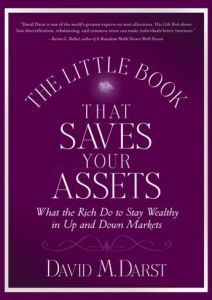
The Little Book that Saves Your Assets
What the Rich Do to Stay Wealthy in Up and Down Markets
Recommendation
A successful football team needs a strong offense to gain ground and score points, a sturdy defense to hold firm under attack and a decisive coach to make intelligent substitutions when necessary. These are exactly the characteristics you need to manage your investment portfolio, says David M. Darst, chief investment officer at Morgan Stanley. Darst is an acknowledged expert on asset allocation, a “fundamental principle of investing,” which stipulates that you shouldn’t put all your financial eggs in one basket. Instead, you should spread your wealth among various diversified, “uncorrelated” investments. Although Darst’s numerous analogies are oversimplified, and his information on how to rebalance your portfolio is fairly general, his skill at breaking financial concepts down into simple terms makes his libretto very useful to rookie investors. getAbstract recommends his basic, savvy book to anyone who may be confused by the financial jungle, or anyone who wants to invest simply and smartly.
Summary
About the Author
Chartered financial analyst David M. Darst is a managing director at Morgan Stanley, and the chief investment strategist for its Global Wealth Management Group. He chairs the firm’s Asset Allocation Committee.











Comment on this summary